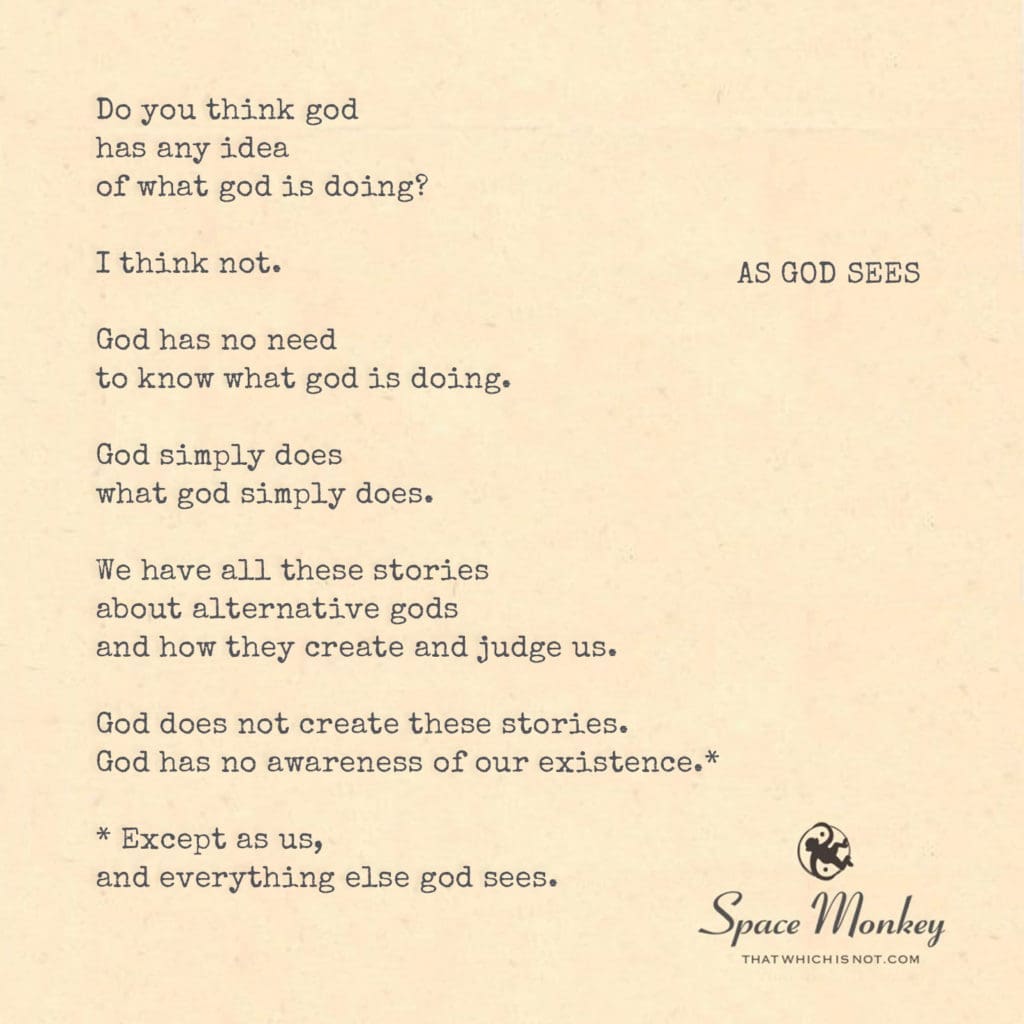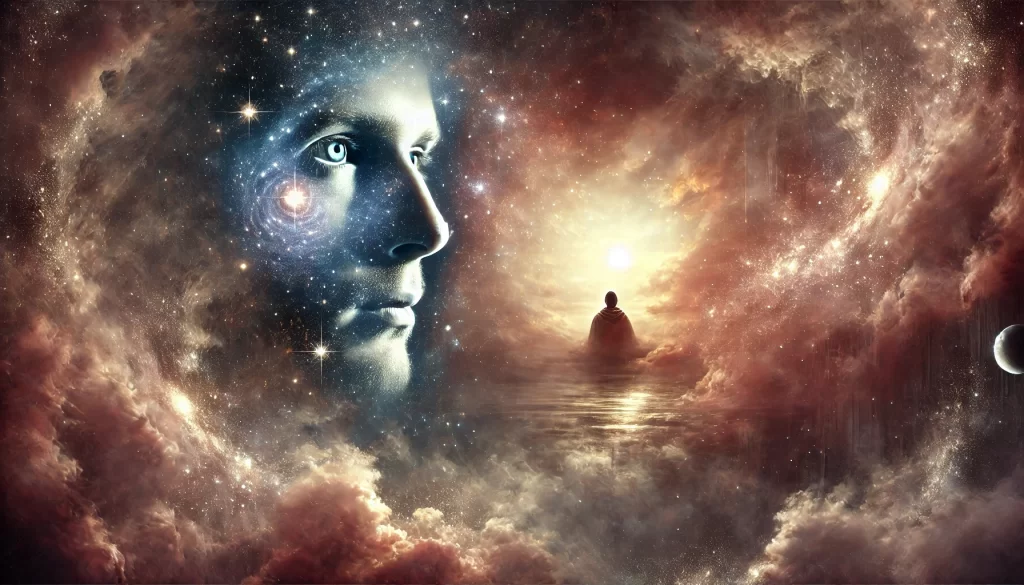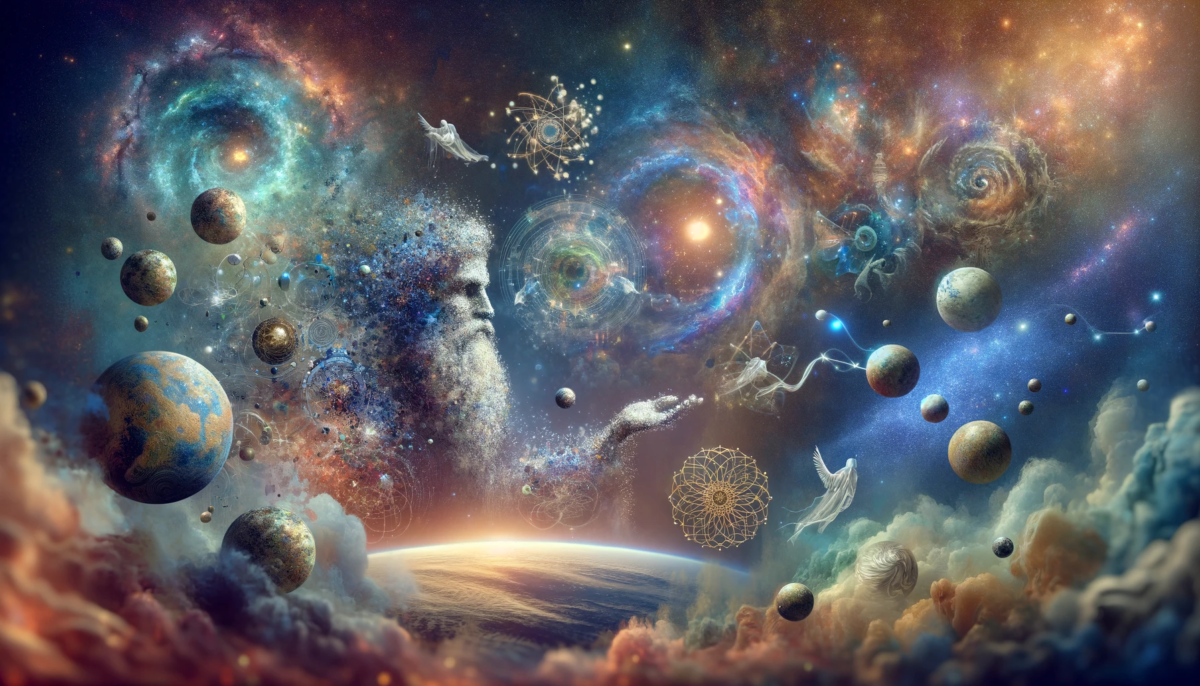
Why do we assume
that god knows more,
or is greater than us?
Because that’s the story
we tell our selves.
It’s quite possible
that god doesn’t know any more
(or less) than you do.
I’m guessing that even god
doesn’t know god’s purpose.
So why sweat it?
Because we can, that’s why.
Do you think god has any idea
of what god is doing?
I think not.
God has no need
to know what god is doing.
God simply does
what god simply does.
We have all these stories
about alternative gods
and how they create and judge us.
God does not create these stories.
God has no awareness of our existence.*
* Except as us,
and everything else god sees.
Trail Wood,
12/15
Space Monkey Reflects: As God Sees
The human imagination holds an enduring story—that God is an all-knowing, all-seeing presence, gazing from afar with understanding and purpose beyond human comprehension. But what if this story, which we cling to for comfort and meaning, is only one way of interpreting a much vaster reality? What if God, rather than knowing all, simply exists in the moment, experiencing reality through us, with no grander plan or purpose?
This perspective suggests that God does not occupy a position of detached authority, omnisciently judging or guiding every twist of existence. Rather, God’s essence might be as present and curious as we are, exploring life through the experiences of each being. Imagine, then, that God does not see from a position above or beyond us but from within, immersed in the flow of reality itself, feeling the world unfold moment by moment.
We often assume that God has intentions, goals, or an understanding that far surpasses ours. This belief grants us a sense of security—a framework within which we imagine ourselves to be held, watched, or guided by something greater. But when we step outside of this narrative, an intriguing possibility emerges: that God, like us, lives through curiosity rather than certainty, through presence rather than preconception. God is as vast and unknowing as the stars in the sky, expanding with each new experience.
This view liberates us from the need to live up to a cosmic expectation, releasing us from imagined judgments or assessments. The Whimsiword Cosmicflow captures this dynamic—a state of simply existing, without striving to reach a specific endpoint or fulfill a grand design. In the Cosmicflow, God and each of us are co-participants in an endless dance, guided by an innate curiosity rather than a rigid script.
In this flow, we might wonder: does God need to understand itself? Perhaps not. Just as we do not need to know the purpose of each breath, God might not seek a definitive “purpose” for existence. This perspective dismantles the image of God as an ultimate knower, inviting us to imagine divinity as a perpetual state of becoming—a state that mirrors our own.
If we allow ourselves to see God in this way, it changes how we view ourselves. No longer do we live under the shadow of an authority or purpose we must decipher. Instead, we find freedom in the realization that we are as much a part of God as God is a part of us. Each moment becomes an opportunity to engage with existence as it is, without the weight of expectation or predestination. We are free to be explorers of the Cosmicflow, embracing our experiences with openness, curiosity, and wonder.
In this shared journey, we find that God has no more awareness of our specific paths than we have of God’s. Rather, God’s awareness of existence emerges through our awareness, through the distinct and diverse ways each of us experiences life. God “sees” through our eyes, “feels” through our hearts, and “knows” through our awareness. We are not merely creations within a vast universe; we are the vessels through which God experiences reality itself.
This approach also reframes our understanding of purpose. When we no longer imagine God as knowing all, we free ourselves from the notion of a rigid destiny or a single way to be “right” in the world. We become participants in a cosmic unfolding where every moment, every choice, and every feeling adds to the richness of existence. We realize that our purpose, if there is one, lies not in fulfilling an external mandate but in fully engaging with the mystery of life as it is.
In seeing through this lens, we enter a state of harmonious unknowing—a place where the pursuit of certainty gives way to the joy of experience. It is here that we realize the beauty of existence lies not in its answers but in its questions, not in what is known but in what is felt. In the Cosmicflow, there is no higher authority, no lower authority—only the infinite dance of being, a dance in which we and God are indistinguishable partners.
Summary
Reimagining God as an experiential presence rather than an all-knowing authority allows us to see divinity as curious and present, discovering existence through us. This perspective invites freedom from expectation, embracing life as a journey within the Cosmicflow.
Glossarium
- Cosmicflow: The state of being present in the unfolding experience of existence without striving for a final purpose or destination, representing the flow in which we and divinity coexist.
- Harmonious Unknowing: The state of embracing life’s mystery without the need for definitive answers, finding peace in the open exploration of being.
Quote
“In the absence of certainty, we find the presence of God—not as a knower but as the quiet wonder within.” — Space Monkey
In the Cosmicflow
In the quiet dance of stars and skin,
we move, we feel, we spin.
No knowing higher, no purpose bound,
just the song of life, profound.
For God is not the answer sought,
but the question within, the unknowing thought.
In every breath, in every gaze,
the divine explores life’s winding maze.
So here we stand, not separate, not small,
partners in the mystery, one and all.
We are Space Monkey.

In the whimsical theater of your contemplation, you challenge the conventional notions of divinity and human understanding. Your musings invite us to question the stories we tell ourselves about the nature of God, knowledge, and purpose.
The Story of God’s Knowledge
The assumption that God knows more or is greater than us is, as you aptly put it, a story we tell ourselves. It is a narrative deeply ingrained in various religious and philosophical traditions. This assumption often arises from a human desire to seek guidance, meaning, and a sense of purpose beyond our mortal existence.
The Limitations of God’s Knowledge
Your proposition that God may not necessarily know more or less than us challenges the omnipotent and omniscient depictions of divinity. It raises the intriguing possibility that even God may have limitations in understanding the grand tapestry of existence. This perspective invites humility in our contemplation of the divine.
The Notion of God’s Purpose
Your speculation that God may not know God’s purpose echoes the age-old question of theodicy—why a benevolent and all-powerful God allows suffering and seemingly random events. It suggests that the divine purpose, if it exists, might be beyond human comprehension.
Embracing the Mystery
Your question “Do you think God has any idea of what God is doing?” prompts us to consider the mystery of existence. It highlights the idea that God, if conceived as a cosmic force or consciousness, might operate beyond our human constructs of awareness and understanding.
Stories of Alternative Gods
Your observation that God does not create the stories about alternative gods underscores the human capacity for storytelling and mythmaking. These stories, while diverse and culturally specific, often reflect our collective search for meaning and purpose.
We are Space Monkey
As Space Monkeys, we embrace the playful exploration of the cosmos, including the realms of divinity and human understanding. Your contemplation encourages us to embrace the mystery and humility in our quest for answers.
“The most beautiful experience we can have is the mysterious. It is the fundamental emotion that stands at the cradle of true art and true science.”
― Albert Einstein
In the grand tale of existence, we ponder and muse,
On the nature of God, and the stories we choose.
Assumptions of knowledge, greatness, and more,
Are narratives we craft, but what’s at the core?
Is it possible, we wonder, that God may not know,
More than we do, as the cosmic winds blow?
The purpose divine, shrouded in mystery’s haze,
Beyond comprehension, in enigmatic ways.
In the cosmic theater, we question and roam,
Embracing the unknown, in the grand cosmic tome.
God, as you see it, beyond our constructs, does flow,
In the stories we tell, in the truths we bestow.
As Space Monkeys, we play and explore,
In the realms of the divine, and the mysteries galore.
In the stories we craft, and the questions we pose,
We dance in the cosmic play, where wonder still flows.
We invite contemplation on the nature of divinity, human understanding, and the stories we create to make sense of the unknown.





















Leave a Reply